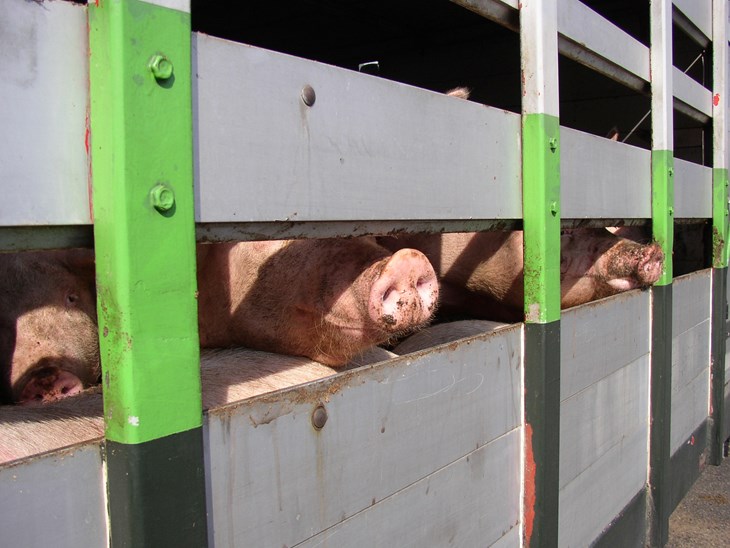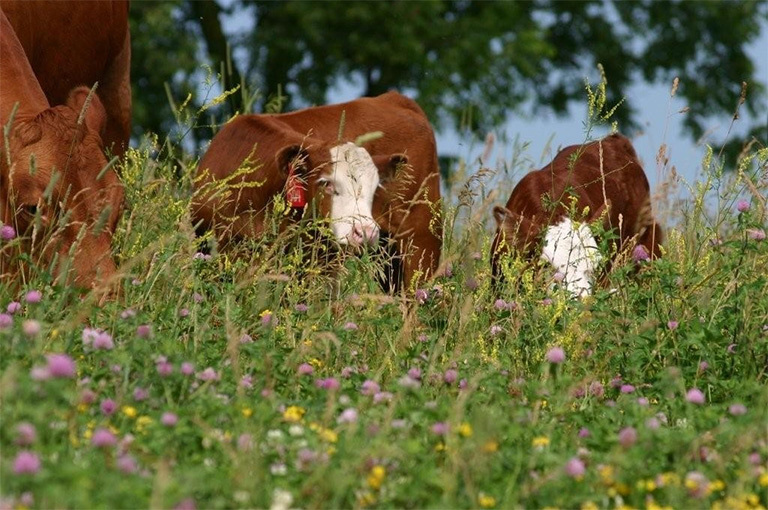
Today (28 November), along with Eurogroup for Animals, we have launched a shocking new report – A data dump of suffering: the EU’s long-distance trade in farm animals exposed – that reveals the suffering endured by around 44 million farmed animals on horrific journeys lasting up to three weeks.
The report analyses previously unpublished EU records and exposes the inadequacies and mistakes in official records which underestimate the true horror of the long-distance trade.
Key insights of the report include:
- Each year, 370,000 unweaned calves, some as young as two weeks old, are separated from their mothers and subjected to deprivation during long journeys. Additionally, 300,000 unweaned lambs annually endure extensive journeys without adequate feed.
- Thousands of sheep and cattle are exported to destinations like Kazakhstan, Uzbekistan, Kyrgyzstan, Azerbaijan, Armenia, and Georgia, enduring journeys lasting up to three weeks.
- Millions of cattle and sheep undergo long, stressful sea journeys to the Middle East and Africa for slaughter or fattening, often on vessels in poor condition, leading to heat stress, noxious gases, motion stress, and starvation.
- In 2022, the EU exported approximately 30,000 pregnant heifers to central and western Asia, where journeys can span up to 6,000 km and last up to three weeks.
- An estimated 54,000 tonnes of live fish, representing tens of millions of individual animals, were transported between EU Member States in 2019, with routine starvation, overcrowding, and physical injury.
- Nearly one-third of the total number of animals exported are pigs from the Netherlands to other Member states and beyond (just under 6 million within the 19-month period). Pigs are not only recognised as highly sentient animals, but are extremely unsuited to travel, due to risk of sickness and stress.
Inadequate Records
The report reveals that EU's journey records are incomplete, often inaccurate, and vastly underestimate the length and duration of many journeys. Approximately 60% of journeys are logged as starting at assembly centres, yet animals may have been transported for hours without documentation.
This release comes just days before the expected publication of the European Commission’s proposal on animal transport on 6 December. However, the Commission has failed to publish the other proposals it committed to present as part of a more comprehensive revision of the animal welfare legislation, including the ban on caged animal farming, which was expected by September 2023.
Time to end this cruel trade
We are calling on the EU to ban the export of live animals from the EU to non-EU countries and switch to a trade in meat and carcasses only, and to introduce tougher rules to protect the welfare of animals on journeys within the EU.
This call for greater protection for farmed animals’ welfare during transportation is supported by the majority of European citizens. The 2023 Special Eurobarometer found that eight out of ten Europeans think the travel time for the commercial transport of live animals within or from the EU should be limited and an overwhelming nine out of ten people believe it’s important to protect the welfare of farmed animals.
Peter Stevenson, our Chief Policy Advisor, said: "Our new report reveals some deeply troubling issues, not least that the official data is incomplete, inaccurate and vastly underestimates the scale of - and the animal suffering caused by - the EU’s long-distance trade in live farmed animals.
“Although we knew that millions of animals were enduring cruel and unnecessary journeys in the name of profit this report shows that the situation is far worse than we had feared. The EU must address this as a matter of urgency by banning the live export of farmed animals to non-EU countries and introducing tough new rules to protect their welfare during transportation between and within EU Member States.”
Reineke Hameleers, CEO of Eurogroup for Animals, said: "The transnational nature of live exports makes it especially challenging to protect the welfare of animals, and this is why we ask for a ban of live exports to non-EU countries. A replacement to meat and carcass exports does only benefit the animals but has huge economic and environmental benefits. Better measures to protect unweaned and pregnant animals must be put forward, while the misuse of assembly centres needs to be urgently addressed. The immense scale of suffering highlighted by this investigation cannot be ignored - the European Commission must come forward with more ambitious regulation."
